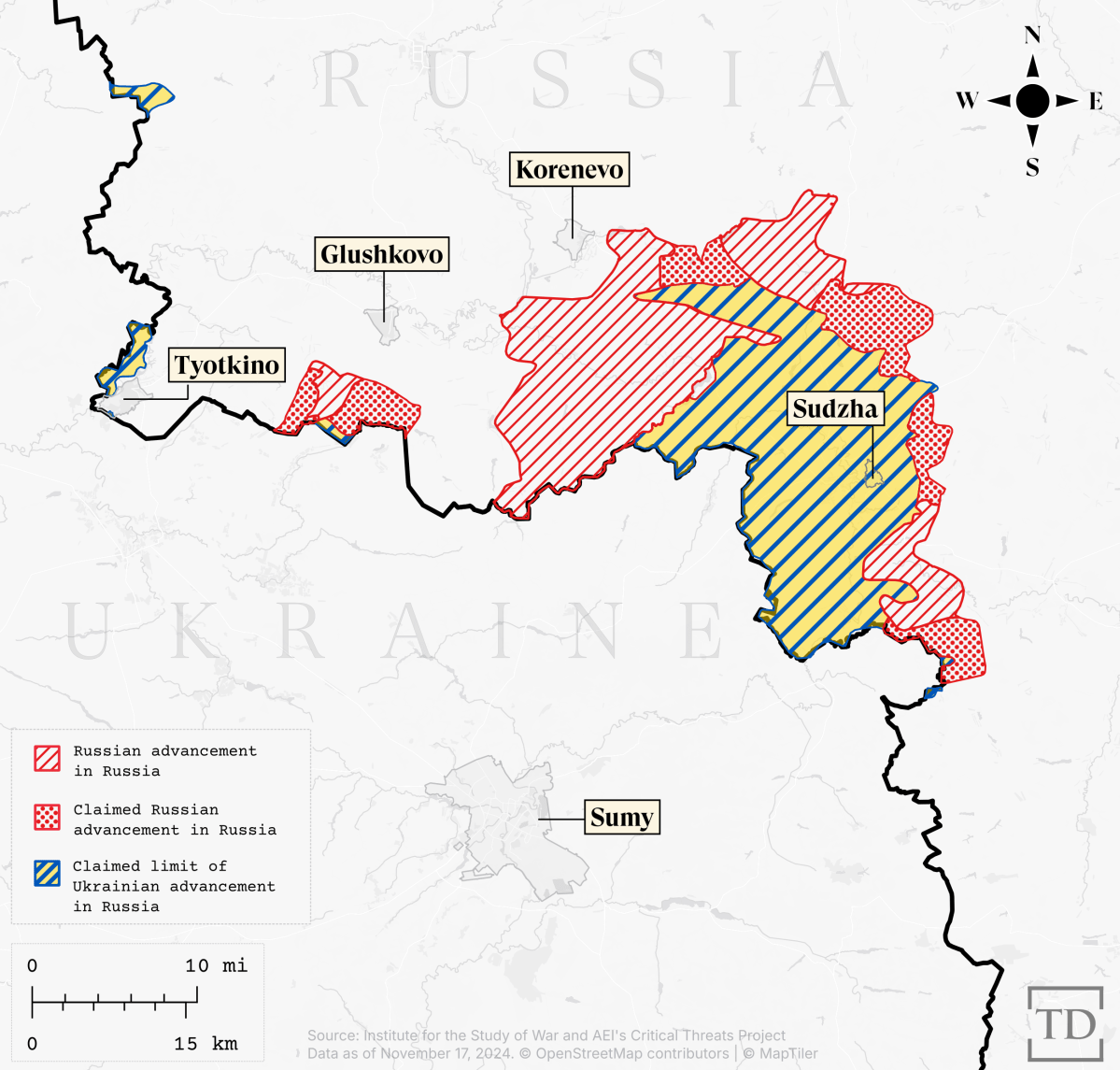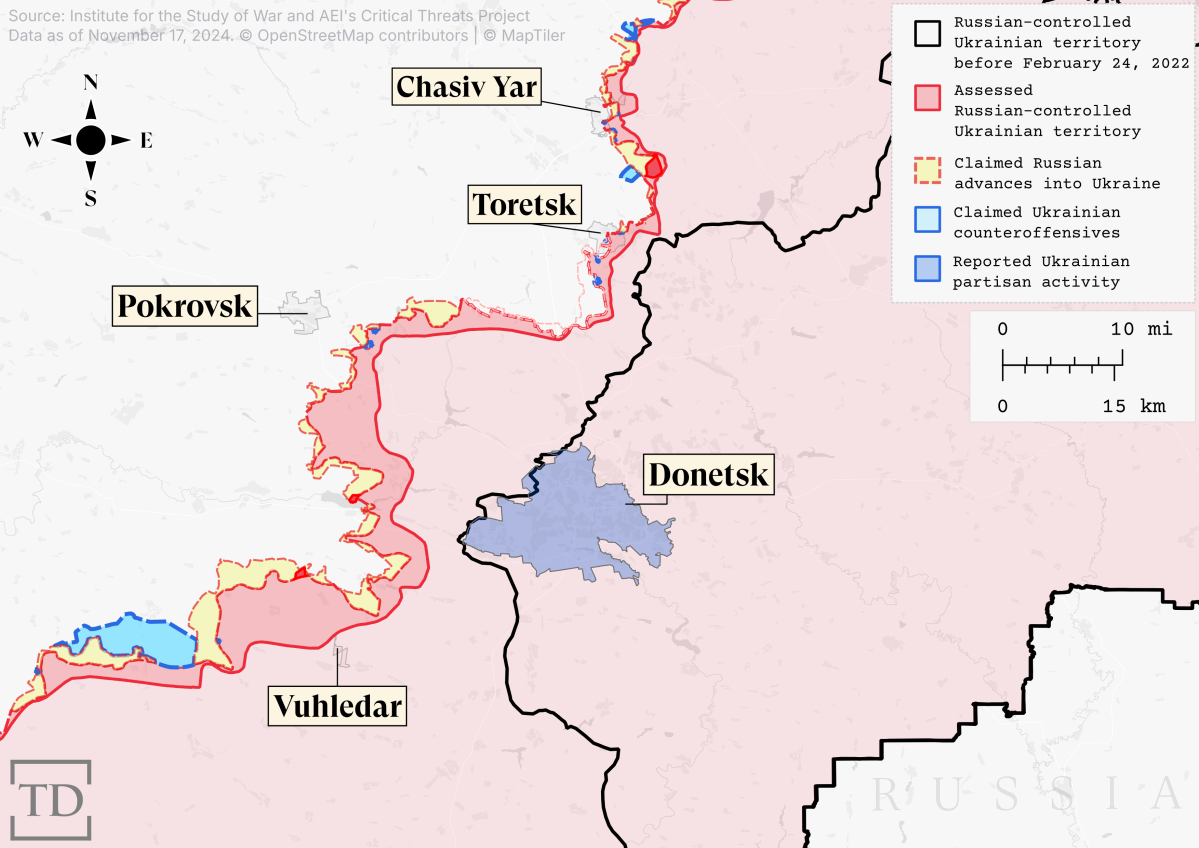Happy Monday! A young Chicago Bears fan went viral yesterday after he collapsed on the couch and broke down in tears following his favorite team’s game-winning field goal being blocked by Karl Brooks of the Green Bay Packers.
But enough about Declan, let’s get on to the news.
Quick Hits: Today’s Top Stories
- President-elect Donald Trump on Friday selected North Dakota Gov. Doug Burgum as his nominee to lead the Department of the Interior, adding that his former primary challenger-turned-supporter would also head the administration’s energy policy as chairman of the newly created National Energy Council. “This Council will oversee the path to U.S. ENERGY DOMINANCE by cutting red tape, enhancing private sector investments across all sectors of the Economy, and by focusing on INNOVATION over long-standing, but totally unnecessary, regulation,” Trump wrote in a statement.
- On Saturday, Trump named Chris Wright, the CEO of a fracking company, as his nominee to lead the Department of Energy. Wright, the leader of Liberty Energy, also sits on the board of a company developing modular nuclear reactors and was a donor to the Trump campaign.
- The president-elect also began last week to fill communications positions in the administration, on Friday appointing his campaign press secretary, Karoline Leavitt, to the same role in the White House. At 27, she will be the youngest White House press secretary in history. Trump also tapped campaign spokesman Steven Cheung to serve as the White House communications director.
- Fox News host Pete Hegseth, whom Trump named as his nominee to lead the Defense Department, was reportedly previously accused of sexual assault following an encounter with a married woman in Monterey, California, in 2017, which local police had investigated. A lawyer for Hegseth confirmed that the host paid the woman in 2020 when he learned she intended to file suit against him, though Hegseth denies any wrongdoing. Trump’s transition team was reportedly surprised by the allegations against Hegseth.
- Multiple outlets reported on Sunday that President Joe Biden has for the first time authorized Ukraine to use American-made long-range missiles to attack targets in Russia, likely focused on areas near the Ukrainian-held enclave in Kursk. Ukraine has long sought the ability to use Army Tactical Missile Systems (ATACMS) to strike military targets in Russian territory, but the Biden administration has resisted over fears of escalation. The new policy is reportedly a response to the presence of North Korean troops in Russia to support Moscow’s war effort.
- Ukrainian President Volodymyr Zelensky said on Sunday that Russia had launched its largest drone and missile attack on Ukraine in months, targeting energy infrastructure and killing at least 10 people, including some children. Zelensky said Moscow had launched some 120 missiles and 90 drones that hit Kyiv as well as Lviv, Donetsk, and Odesa, triggering blackouts in some areas. Ukraine’s state-owned energy company said Sunday that the country would experience “restriction measures” on Monday. Meanwhile, German Chancellor Olaf Scholz spoke to Russian President Vladimir Putin on Friday, urging him to consider negotiations with Ukraine. Scholz’s Russian counterpart reportedly insisted on a settlement that would incorporate Russia’s territorial gains and enshrine Ukrainian neutrality.
- The Israel Defense Forces and Hezbollah confirmed on Sunday that an Israeli strike on a building in central Beirut on Sunday killed the Iranian-backed terrorist group’s head of media relations. Israel reportedly did not issue evacuation warnings ahead of the strike killing Mohammed Afif, which took place uncharacteristically far from the typical Hezbollah strongholds in the southern suburbs of Beirut.
- The Indian government said Sunday that it had conducted its first successful test of a hypersonic missile, potentially putting it in a group with the U.S., Russia, and China as the only countries that have demonstrated hypersonic capabilities. The testing apparently took place on Saturday with a missile that can travel nearly a thousand miles.
- President Joe Biden met with Chinese President Xi Jinping for likely the final time of his presidency on Saturday, chatting with his counterpart on the sidelines of the Asia Pacific Economic Cooperation Summit in Lima, Peru. The pair reportedly agreed to refrain from using artificial intelligence to control nuclear weapons systems and took steps toward an agreement to secure the release of Americans the U.S. considers to be wrongfully detained in China. On Sunday, Biden became the first sitting American president to visit the Amazon, spending several hours in the city of Manaus, Brazil, meeting with local and indigenous leaders involved in conservation efforts.
- Hundreds of residents of Warwick, New York—about 4 miles from the New York-New Jersey border—were placed under a voluntary evacuation order on Sunday as the Jennings Creek wildfire breached a containment line created by firefighters. New York, New Jersey, and Connecticut have received little rainfall since late September, fueling wildfires throughout the region.
What’s Next in Ukraine?

In a Sunday radio interview, Ukrainian President Volodymyr Zelensky said U.S. President-elect Donald Trump reentering the Oval Office would bring the war between his country and Russia to a faster end. “It is certain that the war will end sooner with the policies of the team that will now lead the White House,” he said. “This is their approach, their promise to their citizens.”
What a cautious Zelensky cannot currently predict, though, is precisely what kind of end Trump envisions, considering Russia occupies significant chunks of Ukrainian territory. Much will hang on the success of Russian offensives in the next several months, the performance of the country’s economy, and the resolve of Ukraine’s U.S. backers.
As the war in Ukraine approaches its 1,000th day, prospects for the embattled country look grim. Through grinding assaults backed by artillery and missile barrages, Russian forces have made steady, if modest, gains in eastern Ukraine, especially around the cities of Kharkiv and Avdiivka. And as Trump prepares to move back into the White House, Ukraine could be caught in a double bind, with Russian troops slowly advancing and American support in question.
On Sunday, however, news broke that outgoing President Joe Biden had reportedly granted Ukrainians’ long-held wish for more firepower trained on Russia by lifting restrictions on the use of U.S. long-range missiles on Russian territory. Though the White House had dragged its feet on allowing Ukraine to use the Army Tactical Missile System (ATACMS) to strike targets inside Russian borders over fears of escalation, the recent arrival of North Korean troops in Russia—apparently to help retake Ukrainian-captured Russian territory in Kursk—reportedly spurred the White House to reconsider. White House officials, however, stressed that the missiles would be used to defend Kursk with “a very specific and limited effect.”

“This step is welcome and long overdue,” John Hardie, the director of the Foundation for Defense of Democracies’ Russia program, said Sunday. But he thinks that the Biden administration’s continued wariness of escalation is a mistake. “The Biden and Trump administrations should pursue options to expand Ukraine’s long-range precision-strike capacity, such as transferring JASSM air-launched cruise missiles,” he said. “Enabling Ukraine to strike high-priority targets throughout Russia could put Kyiv in a better position for potential negotiations.”
Even with the modest good news, the picture is still bleak across the frontline. In an interview with Ukrainian radio that aired on Saturday, Zelenksy confirmed that Russian forces were advancing in eastern Ukraine, particularly near the important logistical hub of Pokrovsk in Donetsk. Russia’s advance has been helped by its manpower advantages, compounded by Ukrainian troops’ declining morale and slow deliveries of Western aid.
As winter sets in, Moscow is also beginning a widely anticipated campaign against Ukraine’s power grid. On Sunday, Russia launched some 90 missiles and 120 drones, striking power generation facilities across the country and killing at least 10 civilians. With 65 percent of the country’s electricity infrastructure destroyed by years of fighting, the coming freezing-cold winter months will likely see long, deadly blackouts in Ukrainian towns and cities. After the weekend’s attacks, emergency power cuts were announced throughout the country as temperatures are expected to dip below freezing in Kyiv this week.

Even as uncertainty about the future of U.S. support reigns, there are factors closer to the front that could determine whether Ukraine or Russia has a longer runway—and seem to tilt in favor of Moscow, even if the picture is complicated.
Russia’s economy has proved surprisingly resilient to Western sanctions, able to maintain some standard of living in urban centers and adequately supply its armed forces. Massive defense spending has fueled a military-industrial complex that makes up close to 10 percent of GDP, employing millions of Russians and matching European and American production.
But there are signs that the Russian economy might be encountering trouble in sustaining a war effort. It is increasingly reliant on replacing weapons like artillery shells with foreign aid, and inflation—fueled both by spending on industrial production and bounties for volunteer troops—is nearing nine percent. “What you’ve got is an overheating labor market,” said Robert Hamilton, head of research at the Foreign Policy Research Institute’s Eurasia program. “When pretty much everywhere else in the world, inflation is coming down, for Russia’s to be rising as a problem.”
But Russian economic weakness sufficient to collapse the war effort might not come soon enough for a Ukraine that is increasingly starved of recruits. In a sign of the difficulty the country is having in getting enough men to the front lines, Ukrainian military recruiters have been raiding Kyiv’s concert halls, bars, and nightclubs in search of men out of compliance with military registration. The country also lowered its minimum age of conscription to 25 earlier this year, and tapping into the youngest generations may be politically impossible for Zelensky.
Ukrainians are growing increasingly disillusioned with the war effort. “People I talked to when I was in Ukraine last month, Ukrainians and foreigners, say the support for this government is sort of eroding, and one guy characterized it as paper thin,” said Hamilton. “They have to support their government, but there is increasingly just exhaustion and frustration because this is a three-year war that impacts Ukrainian people every single day in some way.”

It is entirely unclear whether or not a new presidential administration spells doom or continued support for Ukraine: Trump’s rhetoric and foreign policy impulses have differed quite drastically from his own record on Ukraine during his first term in the White House. Even as Trump has frequently praised Russian President Vladimir Putin, his first administration went further than former President Barack Obama’s in approving lethal aid to the country in 2o17 and blocked the construction of the Nord Stream 2 oil pipeline between Russia and Germany, a move Ukraine favored.
This more forceful policy, though, could have been evidence of the influence of traditional Republican foreign policy hawks in Trump’s cabinet and administration the first time around. “You’ve got to disentangle, in the first Trump administration, what was Trump, and what was Jim Mattis, Mike Pompeo, and Mark Esper and others who were in there exercising some kind of adult supervision,” Eric Edelman—the under secretary of defense for policy under former President George W. Bush—told TMD.
And even in the first administration, Trump’s approach to Ukraine was inconsistent, to say the least. “It’s true that the Trump administration provided Ukraine with lethal assistance,” said Edelman. “It’s also true that in 2019 and into 2020 Trump tried to withhold a lot of that in order to blackmail Zelensky into launching an investigation of Hunter Biden and Burisma.”
But the world, and Trump’s Cabinet, have changed significantly since the days when the likes of John Bolton, H.R. McMaster, and John Kelly held the foreign policy levers of the Trump administration. Trump has recently panned Zelensky as a swindler able to convince American lawmakers to part with taxpayer money.
Even supposed hawks in the proposed administration, like Trump’s nominee for Secretary of State, Sen. Marco Rubio of Florida, have made arguments consonant with Trump’s more isolationist stances in the past. In April, Rubio was part of a group of Republicans who voted against a $95 billion aid package to Ukraine, Taiwan, and Israel, calling the bill’s inclusion of money for refugee resettlement “legislative blackmail” and saying that the southern border was a more pressing concern.
Rep. Mike Waltz of Florida, Trump’s pick for national security adviser, also voted against the aid package for Ukraine and has sounded cautionary notes about America’s current Ukraine policy. “In the near term, U.S. military aid must be contingent on European burden sharing and equal European assistance going forward,” he wrote in an op-ed earlier this year. But he has also advocated for allowing Ukraine to use more long-range weapons and for cracking down on Russian energy exports in order to force Putin to the negotiating table.
Trump’s nominee for secretary of defense, Fox News host Pete Hegseth, has likewise been hot and cold on support for Kyiv. Early in the war, he vociferously backed aid to Ukraine, but on a podcast last week, Hegseth cautioned against long-term American involvement in Eastern Europe that would potentially provoke Putin: “I don’t want American intervention driving deep into Europe and making him feel like he’s so much on his heels that he does have to—because early on, he was talking about nukes,” he said.
Given the ambiguities of the incoming administration’s stance toward Ukraine, the Biden administration—which critics accuse of having provided too little, too late at virtually every point in the war—is busy getting as much military aid out the door as possible. “President Biden has committed to making sure that every dollar we have at our disposal will be pushed out the door between now and January 20th,” Secretary of State Antony Blinken said in a statement on Wednesday.
Pushing out all available aid, however, is easier said than done. Much of the aid takes the form of military equipment pulled “off the shelf,” but the Pentagon is cautious about depleting its own stockpiles, slowing the delivery. A new administration will still be able to stop billions of dollars of the aid allocated by Congress, even if it has technically been committed.
Zelensky’s expectation that the war will come to an end soon is perhaps not unfounded. Trump has said he could end the war in 24 hours. Putin, however, might have a longer timeframe in mind. As Zelensky said in his interview, “it benefits him to sit down, talk, and not reach an agreement.” For now, the waiting game is on.
Worth Your Time
- The question of whether cheerleading is a sport has been heavily debated—and lobbied. For the New York Times Magazine, David Gauvey Herbert reported on how one company, and the man behind it, has engineered the development of cheer into something lucrative, acrobatic, and dangerous. “Nationwide, just over a million children, mostly girls, participate in cheer each year (some estimates are even higher), more than the number who play softball or lacrosse,” he wrote. “And almost every part of that world is dominated by a single company: Varsity Spirit. … Parents have reported spending upward of $10,000 a year per child in competitive cheer, with Varsity controlling, by some estimates, more than 80 percent of that market. Jeff Webb, the man who founded Varsity, has been called ‘John D. Rockefeller with glitter’ and the ‘Dark Sith Lord’ of cheer by some of his detractors. Webb, now in his 70s, pioneered the gravity-defying acrobatics of modern cheer. He paired his innovations with a desire for control over every facet of the sport, which he pursued over the course of more than four decades.”
- For the Financial Times, Imogen West-Knights spent three days at a festival for Bigfoot true believers. “I wouldn’t have guessed that Bigfoot is a preoccupation for anybody,” she wrote. “In this day and age, where the suspicious-minded thinker has so many more pressing conspiracy theories to choose from, being into Bigfoot feels kind of hokey. Dated, even. The heyday of Bigfoot hunting was a good 60 years ago. … The North American Bigfoot Center in—incredibly—Boring, Oregon, receives dozens of reports every week about strange encounters in the forests. A Bigfoot has never been captured alive or dead, and there is no publicly available, conclusive evidence of any other kind that they exist. The FBI has been involved, as has Oxford University and the Smithsonian Museum, and all have come up with nothing. And yet, there were Peter and I, one weekend this past summer, driving to Oakridge to meet the believers.”
Presented Without Comment
Axios: Johnson Argues Gaetz Report Should Stay Sealed as Ex-Rep a “Private Citizen”
Also Presented Without Comment
Washington Post: Kari Lake Settles Election Defamation Case Brought by Arizona Official
In the Zeitgeist
The guys of TMD expressed keen interest in The Return, a new film about the Trojan War, suggesting perhaps the viral question “How often do you think about the Roman empire?” is insufficient and should be expanded to “How often do you think about classical civilization?” 📈
Toeing the Company Line
- Calling all college students: Come work with us! The Dispatch is hiring a full-time intern for the spring. If you, or someone you know, would be a good fit, click here for more details and to complete an application!
- In the newsletters: The Dispatch Politics crew covered the looming fight in the Senate over Matt Gaetz’s nomination, Jonah argued that Gaetz is Trump’s worst Cabinet pick thus far, Nick suggested that (🔒) Trump may be misunderstanding the American people’s desires by promising to name RFK Jr. to lead the Department of Health and Human Services, Chris answered (🔒) reader mail, and Asma T. Uddin made the case in Dispatch Faith that true interfaith connection that doesn’t flatten key theological differences is possible and necessary.
- On the podcasts: Sarah, Steve, and David French discussed Trump’s Cabinet picks so far on the Dispatch Podcast roundtable, Jonah reflected on the first Dispatch Summit and engaged in some rank punditry on the weekend Remnant, and Michael talked to Jeffrey Bilbro about his new book, Words for Conviviality: Media Technologies, and Practices of Hope. On today’s episode of The Dispatch Podcast, Jamie is joined by National Review columnist Andy McCarthy to discuss the Trump Cabinet picks thus far.
- On the site over the weekend: Adrian Nguyen reminisced on Fight Club 25 years after its release, Christian Alejandro Gonzalez reviewed Alexandre Lefebvre’s new book on liberalism as a way of life, and Jeffrey Bilbro explained what the telegraph can teach us about our current moment.
- On the site today: Yascha Mounk writes this week’s Monday Essay about the election results and what they portend for the future of the left and identity politics.
Let Us Know
Why do you think the Biden administration finally relented to Ukraine’s requests? How do you expect the incoming Trump administration to approach the conflict?








Please note that we at The Dispatch hold ourselves, our work, and our commenters to a higher standard than other places on the internet. We welcome comments that foster genuine debate or discussion—including comments critical of us or our work—but responses that include ad hominem attacks on fellow Dispatch members or are intended to stoke fear and anger may be moderated.
With your membership, you only have the ability to comment on The Morning Dispatch articles. Consider upgrading to join the conversation everywhere.